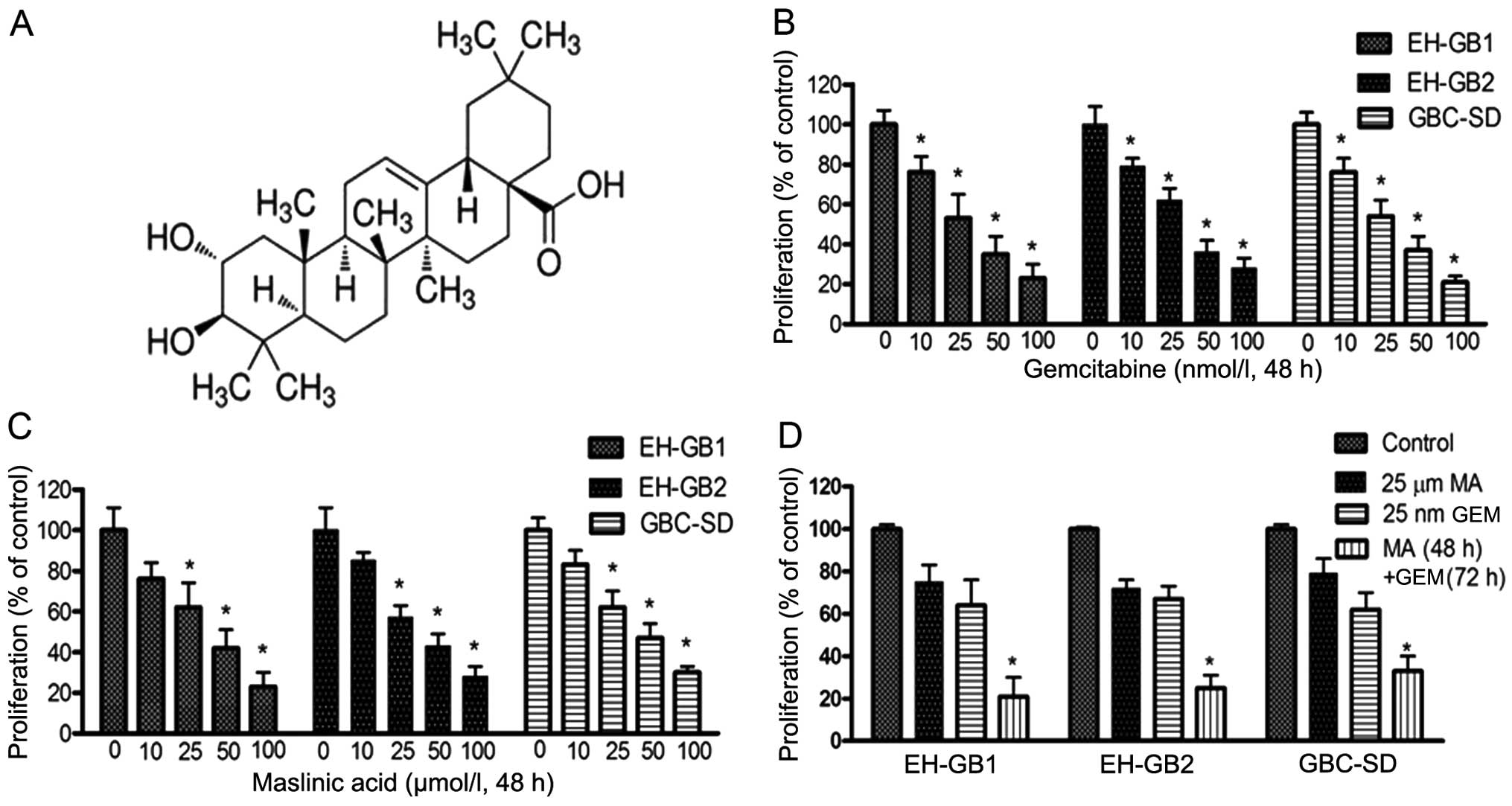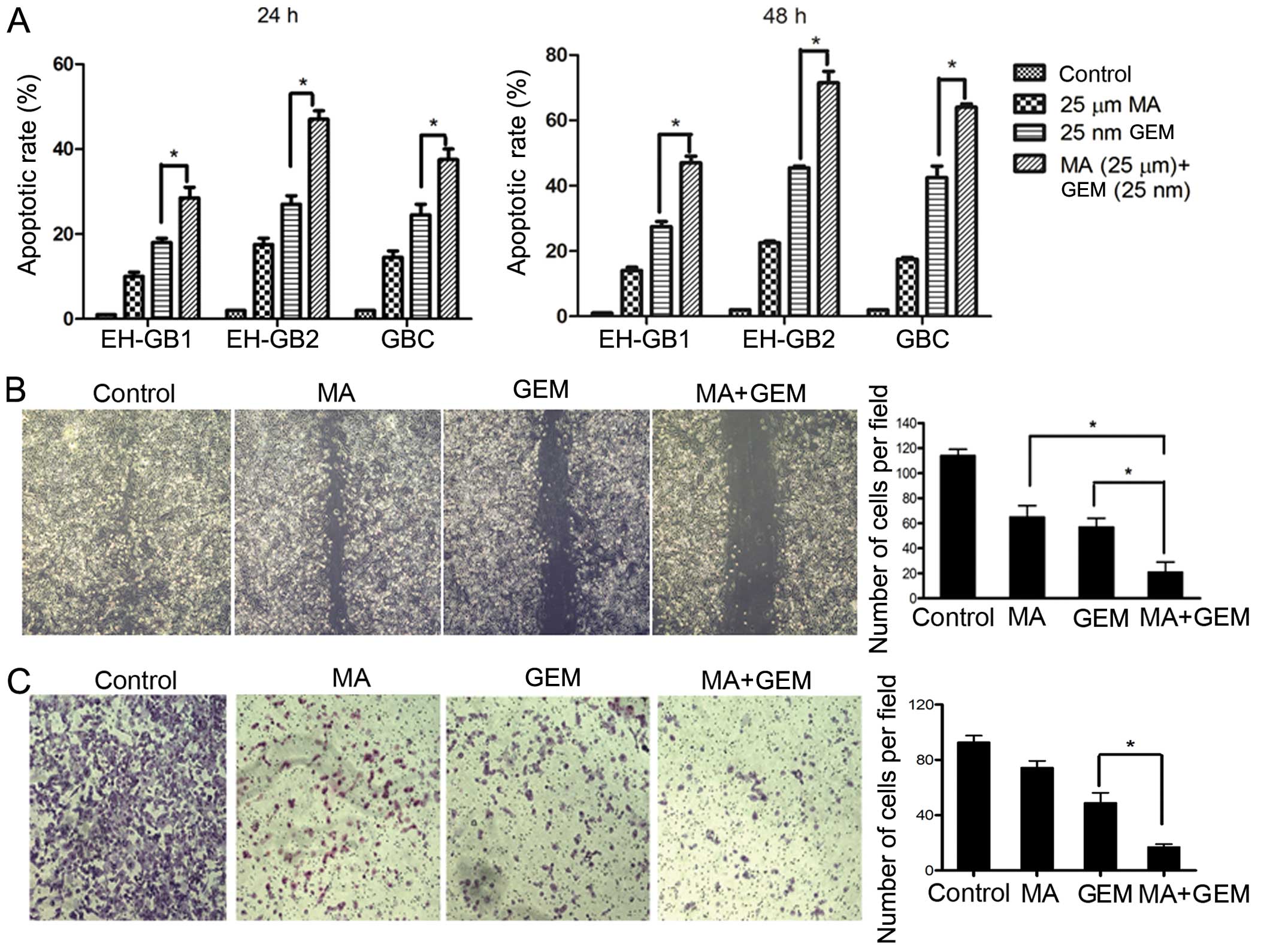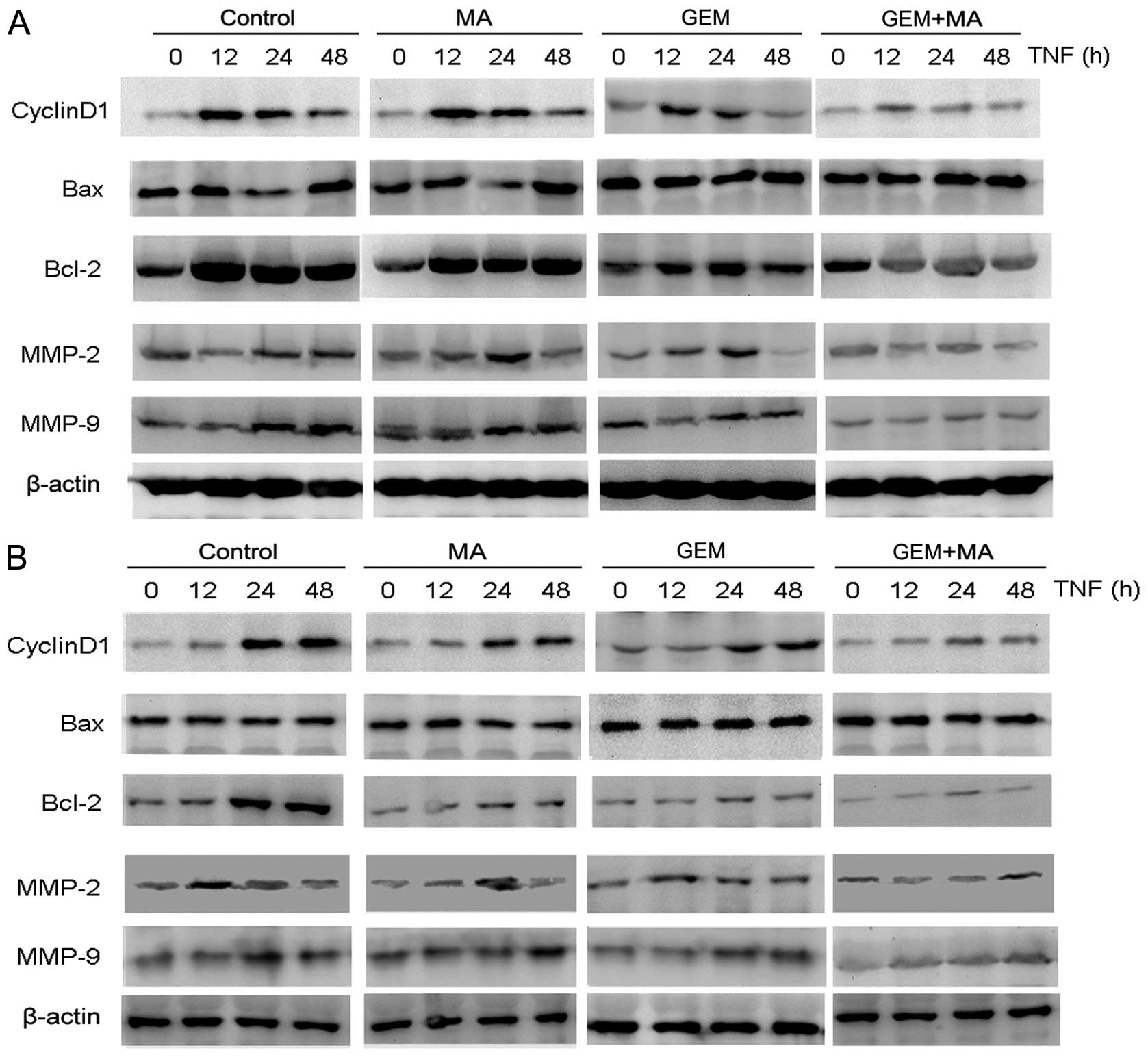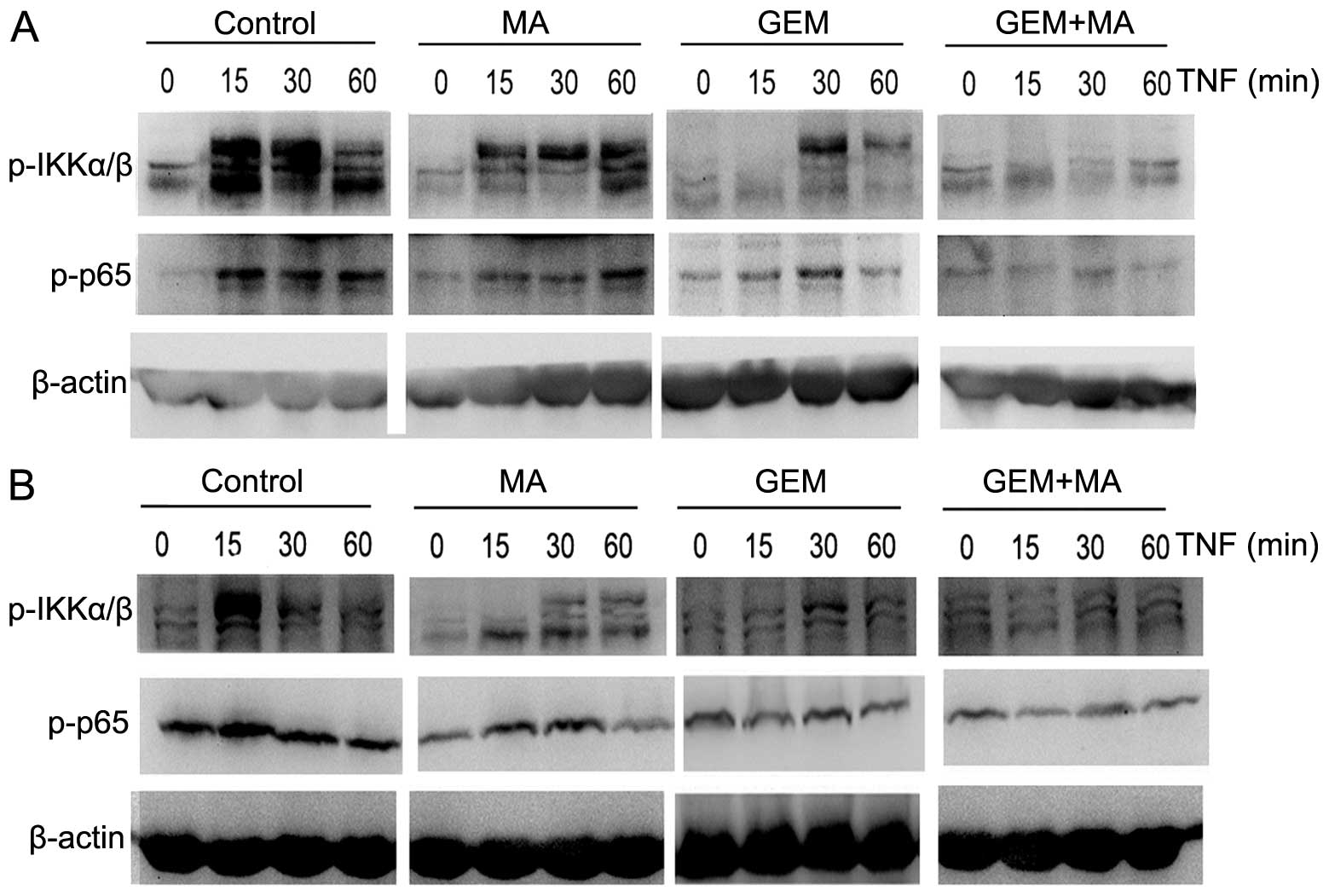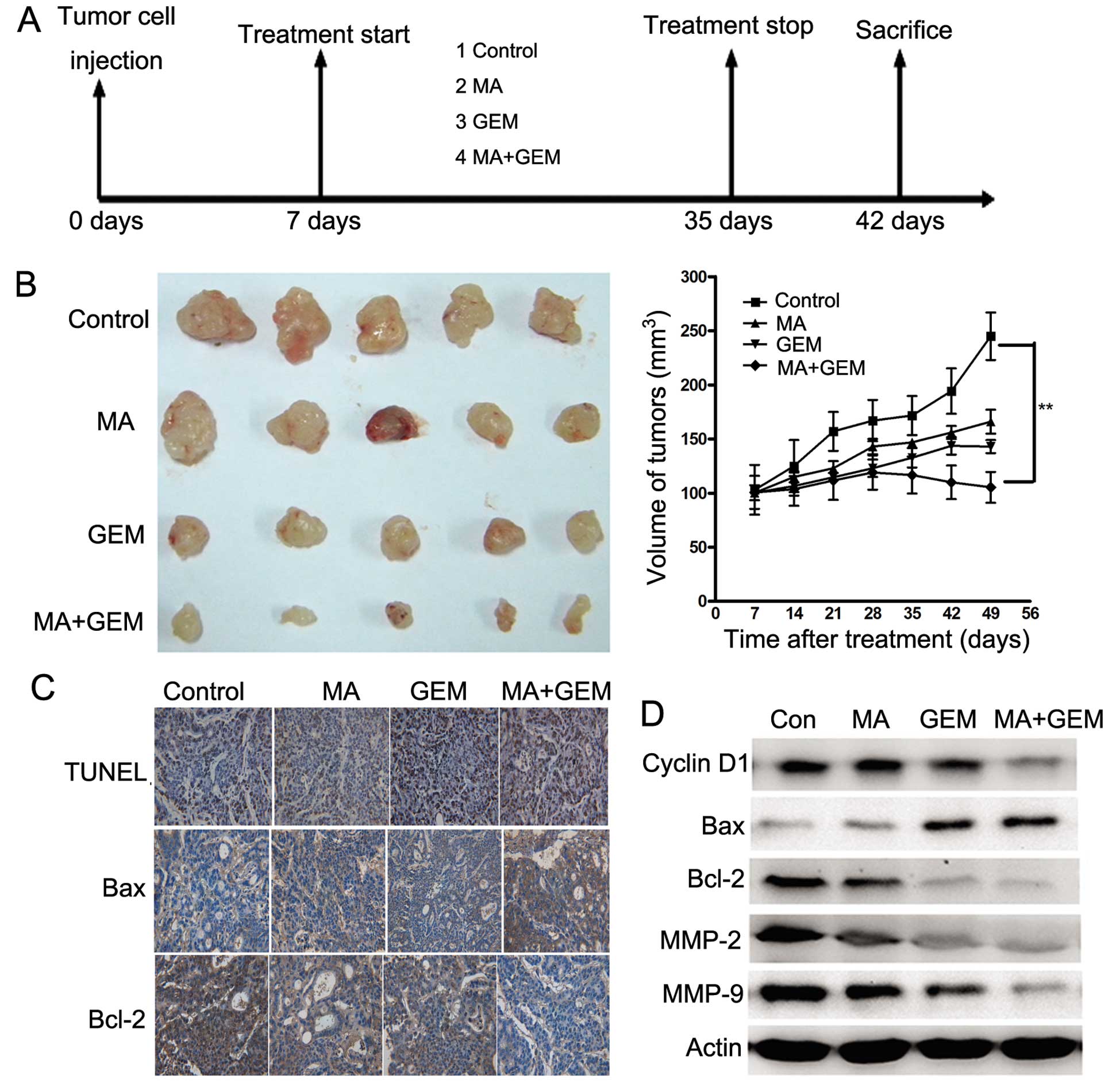|
1
|
Matsuba T, Qiu D, Kurosawa M, et al; JACC
Study Group. Overview of epidemiology of bile duct and gallbladder
cancer focusing on the JACC Study. J Epidemiol. 15(Suppl 2):
S150–S156. 2005. View Article : Google Scholar : PubMed/NCBI
|
|
2
|
Randi G, Malvezzi M, Levi F, et al:
Epidemiology of biliary tract cancers: an update. Ann Oncol.
20:146–159. 2009. View Article : Google Scholar
|
|
3
|
Tchivounda HP, Koudogbo B, Besace Y and
Casadevall E: Triterpene saponins from Cylicodiscus gabunensis.
Phytochemistry. 30:2711–2716. 1991. View Article : Google Scholar : PubMed/NCBI
|
|
4
|
Xu HX, Zeng FQ, Wan M and Sim KY: Anti-HIV
triterpene acids from Geum japonicum. J Nat Prod. 59:643–645. 1996.
View Article : Google Scholar : PubMed/NCBI
|
|
5
|
Serra C, Lampis G, Pompei R and Pinza M:
Antiviral activity of new triterpenic derivatives. Pharmacol Res.
29:359–366. 1994. View Article : Google Scholar : PubMed/NCBI
|
|
6
|
Montilla MP, Agil A, Navarro MC, et al:
Antioxidant activity of maslinic acid, a triterpene derivative
obtained from Olea europaea. Planta Med. 69:472–474. 2003.
View Article : Google Scholar : PubMed/NCBI
|
|
7
|
Liu J, Sun H, Duan W, Mu D and Zhang L:
Maslinic acid reduces blood glucose in KK-Ay mice. Biol Pharm Bull.
30:2075–2078. 2007. View Article : Google Scholar : PubMed/NCBI
|
|
8
|
Reyes-Zurita FJ, Rufino-Palomares EE,
Lupianez JA and Cascante M: Maslinic acid, a natural triterpene
from Olea europaea L., induces apoptosis in HT29 human colon-cancer
cells via the mitochondrial apoptotic pathway. Cancer Lett.
273:44–54. 2009. View Article : Google Scholar
|
|
9
|
Juan ME, Planas JM, Ruiz-Gutierrez V,
Daniel H and Wenzel U: Antiproliferative and apoptosis-inducing
effects of maslinic and oleanolic acids, two pentacyclic
triterpenes from olives, on HT-29 colon cancer cells. Br J Nutr.
100:36–43. 2008. View Article : Google Scholar : PubMed/NCBI
|
|
10
|
Martin R, Carvalho-Tavares J, Ibeas E,
Hernandez M, Ruiz-Gutierrez V and Nieto ML: Acidic triterpenes
compromise growth and survival of astrocytoma cell lines by
regulating reactive oxygen species accumulation. Cancer Res.
67:3741–3751. 2007. View Article : Google Scholar : PubMed/NCBI
|
|
11
|
Li C, Yang Z, Zhai C, et al: Maslinic acid
potentiates the anti-tumor activity of tumor necrosis factor alpha
by inhibiting NF-kappaB signaling pathway. Mol Cancer. 9:732010.
View Article : Google Scholar : PubMed/NCBI
|
|
12
|
Lafarge S, Hamzeh-Cognasse H, Richard Y,
et al: Complexes between nuclear factor-κB p65 and signal
transducer and activator of transcription 3 are key actors in
inducing activation-induced cytidine deaminase expression and
immunoglobulin A production in CD40L plus interleukin-10-treated
human blood B cells. Clin Exp Immunol. 166:171–183. 2011.
View Article : Google Scholar : PubMed/NCBI
|
|
13
|
Ozes ON, Mayo LD, Gustin JA, Pfeffer SR,
Pfeffer LM and Donner DB: NF-kappaB activation by tumour necrosis
factor requires the Akt serine-threonine kinase. Nature. 401:82–85.
1999. View Article : Google Scholar : PubMed/NCBI
|
|
14
|
Mori N, Fujii M, Ikeda S, et al:
Constitutive activation of NF-kappaB in primary adult T-cell
leukemia cells. Blood. 93:2360–2368. 1999.PubMed/NCBI
|
|
15
|
Ma G, Tabanca N, Husnu Can Baser K, et al:
Inhibition of NF-kappaB-mediated transcription and induction of
apoptosis in human breast cancer cells by
epoxypseudoisoeugenol-2-methyl butyrate. Cancer Chemother
Pharmacol. 63:673–680. 2009. View Article : Google Scholar
|
|
16
|
Camp ER, Li J, Minnich DJ, et al:
Inducible nuclear factor-kappaB activation contributes to
chemotherapy resistance in gastric cancer. J Am Coll Surg.
199:249–258. 2004. View Article : Google Scholar : PubMed/NCBI
|
|
17
|
Bottero V, Busuttil V, Loubat A, et al:
Activation of nuclear factor kappaB through the IKK complex by the
topoisomerase poisons SN38 and doxorubicin: a brake to apoptosis in
HeLa human carcinoma cells. Cancer Res. 61:7785–7791.
2001.PubMed/NCBI
|
|
18
|
Arlt A, Vorndamm J, Breitenbroich M, et
al: Inhibition of NF-kappaB sensitizes human pancreatic carcinoma
cells to apoptosis induced by etoposide (VP16) or doxorubicin.
Oncogene. 20:859–868. 2001. View Article : Google Scholar : PubMed/NCBI
|
|
19
|
Doval DC, Sekhon JS, Gupta SK, et al: A
phase II study of gemcitabine and cisplatin in chemotherapy-naive,
unresectable gall bladder cancer. Br J Cancer. 90:1516–1520. 2004.
View Article : Google Scholar : PubMed/NCBI
|
|
20
|
Penz M, Kornek GV, Raderer M, et al: Phase
II trial of two-weekly gemcitabine in patients with advanced
biliary tract cancer. Ann Oncol. 12:183–186. 2001. View Article : Google Scholar : PubMed/NCBI
|
|
21
|
Desai S, Ben-Josef E, Griffith KA, et al:
Gemcitabine-based combination chemotherapy followed by radiation
with capecitabine as adjuvant therapy for resected pancreas cancer.
Int J Radiat Oncol Biol Phys. 75:1450–1455. 2009. View Article : Google Scholar : PubMed/NCBI
|
|
22
|
Scagliotti GV, Parikh P, von Pawel J, et
al: Phase III study comparing cisplatin plus gemcitabine with
cisplatin plus peme-trexed in chemotherapy-naive patients with
advanced-stage non-small-cell lung cancer. J Clin Oncol.
26:3543–3551. 2008. View Article : Google Scholar : PubMed/NCBI
|
|
23
|
Ferrandina G, Ludovisi M, Lorusso D, et
al: Phase III trial of gemcitabine compared with pegylated
liposomal doxorubicin in progressive or recurrent ovarian cancer. J
Clin Oncol. 26:890–896. 2008. View Article : Google Scholar : PubMed/NCBI
|
|
24
|
Shelley M, Cleves A, Wilt TJ and Mason M:
Gemcitabine for unresectable, locally advanced or metastatic
bladder cancer. Cochrane Database Syst Rev. April 13–2011.(Epub
ahead of print). PubMed/NCBI
|
|
25
|
Knox JJ, Hedley D, Oza A, et al: Combining
gemcitabine and capecitabine in patients with advanced biliary
cancer: a phase II trial. J Clin Oncol. 23:2332–2338. 2005.
View Article : Google Scholar : PubMed/NCBI
|
|
26
|
Mooi LY, Wahab NA, Lajis NH and Ali AM:
Chemopreventive properties of phytosterols and maslinic acid
extracted from Coleus tuberosus in inhibiting the expression of EBV
early-antigen in Raji cells. Chem Biodivers. 7:1267–1275. 2010.
View Article : Google Scholar : PubMed/NCBI
|
|
27
|
Li LF, Hu HZ, Liu C, et al: Establishment
and characterization of a human gallbladder carcinoma cell line
EH-GB1 originated from a metastatic tumor. Zhonghua Zhong Liu Za
Zhi. 32:84–87. 2010.(In Chinese). PubMed/NCBI
|
|
28
|
Wang JH, Li LF, Yu Y, et al: Establishment
and characterization of a cell line, EH-GB2, derived from hepatic
metastasis of gall-bladder cancer. Oncol Rep. 27:775–782. 2012.
|
|
29
|
Chou TC: Drug combination studies and
their synergy quantification using the Chou-Talalay method. Cancer
Res. 70:440–446. 2010. View Article : Google Scholar : PubMed/NCBI
|
|
30
|
Klein CA: Cancer. The metastasis cascade.
Science. 321:1785–1787. 2008. View Article : Google Scholar : PubMed/NCBI
|
|
31
|
Karin M: Nuclear factor-kappaB in cancer
development and progression. Nature. 441:431–436. 2006. View Article : Google Scholar : PubMed/NCBI
|
|
32
|
Carlsson G, Gullberg B and Hafström L:
Estimation of liver tumor volume using different formulas - an
experimental study in rats. J Cancer Res Clin Oncol. 105:20–23.
1983. View Article : Google Scholar : PubMed/NCBI
|
|
33
|
Lee CH, Jeon YT, Kim SH and Song YS:
NF-kappaB as a potential molecular target for cancer therapy.
Biofactors. 29:19–35. 2007. View Article : Google Scholar : PubMed/NCBI
|
|
34
|
Li F and Sethi G: Targeting transcription
factor NF-kappaB to overcome chemoresistance and radioresistance in
cancer therapy. Biochim Biophys Acta. 1805:167–180. 2010.PubMed/NCBI
|
|
35
|
Ueno H, Kiyosawa K and Kaniwa N:
Pharmacogenomics of gemcitabine: can genetic studies lead to
tailor-made therapy? Br J Cancer. 97:145–151. 2007. View Article : Google Scholar : PubMed/NCBI
|
|
36
|
Knudsen KE, Diehl JA, Haiman CA and
Knudsen ES: Cyclin D1: polymorphism, aberrant splicing and cancer
risk. Oncogene. 25:1620–1628. 2006. View Article : Google Scholar : PubMed/NCBI
|
|
37
|
Fan YZ, Fu JY, Zhao ZM and Chen CQ:
Inhibitory effect of norcantharidin on the growth of human
gallbladder carcinoma GBC-SD cells in vitro. Hepatobiliary Pancreat
Dis Int. 6:72–80. 2007.PubMed/NCBI
|
|
38
|
Ma HB, Hu HT, Di ZL, et al: Association of
cyclin D1, p16 and retinoblastoma protein expressions with
prognosis and metastasis of gallbladder carcinoma. World J
Gastroenterol. 11:744–747. 2005. View Article : Google Scholar
|
|
39
|
Reyes-Zurita FJ, Pachón-Peña G, Lizárraga
D, Rufino-Palomares EE, Cascante M and Lupianez JA: The natural
triterpene maslinic acid induces apoptosis in HT29 colon cancer
cells by a JNK-p53-dependent mechanism. BMC Cancer. 11:1542011.
View Article : Google Scholar : PubMed/NCBI
|
|
40
|
Parra A, Rivas F, Martin-Fonseca S,
Garcia-Granados A and Martinez A: Maslinic acid derivatives induce
significant apoptosis in b16f10 murine melanoma cells. Eur J Med
Chem. 46:5991–6001. 2011. View Article : Google Scholar : PubMed/NCBI
|
|
41
|
Nakanishi C and Toi M: Nuclear
factor-kappaB inhibitors as sensitizers to anticancer drugs. Nat
Rev Cancer. 5:297–309. 2005. View Article : Google Scholar : PubMed/NCBI
|
|
42
|
Zhu AX, Hong TS, Hezel AF and Kooby DA:
Current management of gallbladder carcinoma. Oncologist.
15:168–181. 2010. View Article : Google Scholar : PubMed/NCBI
|
|
43
|
Bauer JA, Lupica JA, Schmidt H, et al:
Nitrosylcobalamin potentiates the anti-neoplastic effects of
chemotherapeutic agents via suppression of survival signaling. PLoS
One. 2:e13132007. View Article : Google Scholar : PubMed/NCBI
|
|
44
|
Chawla-Sarkar M, Bauer JA, Lupica JA, et
al: Suppression of NF-kappa B survival signaling by
nitrosylcobalamin sensitizes neoplasms to the anti-tumor effects of
Apo2L/TRAIL. J Biol Chem. 278:39461–39469. 2003. View Article : Google Scholar : PubMed/NCBI
|
|
45
|
Guan T, Qian Y, Tang X, et al: Maslinic
acid, a natural inhibitor of glycogen phosphorylase, reduces
cerebral ischemic injury in hyperglycemic rats by GLT-1
up-regulation. J Neurosci Res. 89:1829–1839. 2011. View Article : Google Scholar : PubMed/NCBI
|
|
46
|
Chao DT and Korsmeyer SJ: BCL-2 family:
regulators of cell death. Annu Rev Immunol. 16:395–419. 1998.
View Article : Google Scholar : PubMed/NCBI
|
|
47
|
Boise LH, Gottschalk AR, Quintans J and
Thompson CB: Bcl-2 and Bcl-2-related proteins in apoptosis
regulation. Curr Top Microbiol Immunol. 200:107–121.
1995.PubMed/NCBI
|
|
48
|
Fahy BN, Schlieman MG, Mortenson MM,
Virudachalam S and Bold RJ: Targeting BCL-2 overexpression in
various human malignancies through NF-kappaB inhibition by the
proteasome inhibitor bortezomib. Cancer Chemother Pharmacol.
56:46–54. 2005. View Article : Google Scholar : PubMed/NCBI
|
|
49
|
Pulukuri SM and Rao JS: Matrix
metalloproteinase-1 promotes prostate tumor growth and metastasis.
Int J Oncol. 32:757–765. 2008.PubMed/NCBI
|
|
50
|
Wu W, Wang R, Liu H, et al: Prediction of
prognosis in gallbladder carcinoma by CD147 and MMP-2
immunohistochemistry. Med Oncol. 26:117–123. 2009. View Article : Google Scholar
|
|
51
|
Park SY, Nho CW, Kwon DY, Kang YH, Lee KW
and Park JH: Maslinic acid inhibits the metastatic capacity of
DU145 human prostate cancer cells: possible mediation via
hypoxia-inducible factor-1α signalling. Br J Nutr. 109:210–222.
2013. View Article : Google Scholar
|















